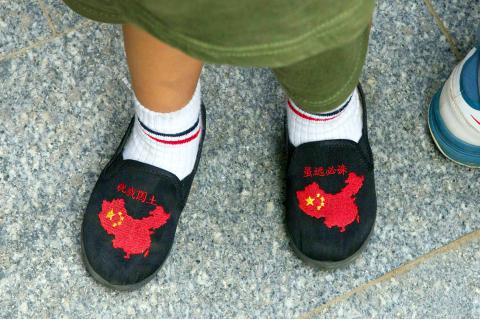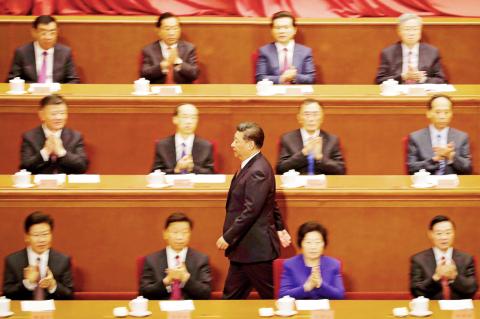Chinese President Xi Jinping (習近平) yesterday issued a tough line on national sovereignty amid multiple territorial disputes with its neighbors, saying China will never permit the loss of “any piece” of its land to outsiders.
Xi’s declaration came during a nearly one-hour speech in Beijing marking the 90th anniversary of the founding of the People’s Liberation Army (PLA), which has formed a key pillar of support for the Chinese Communist Party (CCP) since 1927 and is the world’s largest standing military, with 2.3 million members.
“The Chinese people treasure peace and we absolutely do not engage in invasion and expansion. However, we have the confidence to conquer all forms of invasion,” Xi told government leaders and current and retired PLA members gathered at the Great Hall of the People.

Photo: AP
“We absolutely will not permit any person, any organization, any political party — at any time, in any form — to separate any piece of Chinese territory from China,” Xi said to applause. “No one should expect us to swallow the bitter fruit of damage to our sovereignty, security and development interests.”
Xi made no reference to any specific conflicts or disputes during his address, which focused largely on the PLA’s growth from a scrappy guerrilla force fighting Chiang Kai-shek’s (蔣介石) Chinese Nationalist Party (KMT) and Japanese invaders into one of the world’s most powerful, if largely untested, militaries.
Xi also emphasized that the military’s highest loyalty is to the CCP, underscoring the PLA’s key role as regime preserver through crises such as the bloody suppression of 1989 pro-democracy protests at Tiananmen Square.

Photo: AFP
Top Chinese leaders have consistently rejected calls to make the PLA loyal to the government and people instead.
“The people’s army will resolutely safeguard the leadership of the Chinese Communist Party and our country’s socialist system, resolutely safeguard national sovereignty, security and development interests, and resolutely safeguard regional and world peace,” Xi said.
The speech followed a parade on Sunday at a training ground on the edge of the Gobi Desert in Inner Mongolia during which Xi donned fatigues and declared that the military has the “confidence and capability” to ensure China’s sovereignty, security and national interests.
Xi, who commands the PLA as chairman of the Central Military Commission, has frequently spoken of his “China Dream” to restore China to a leadership position in international affairs with a modern, far-reaching military force to match.
In related news, China yesterday formally opened its first overseas military base with a flag-raising ceremony in Djibouti in the Horn of Africa.
China began construction of a logistics base in Djibouti last year. It will be used to resupply navy ships taking part in peacekeeping and humanitarian missions off the coasts of Yemen and Somalia, in particular. It is China’s first overseas naval base, though Beijing officially describes it as a logistics facility.
State radio said more than 300 people attended the ceremony, including deputy Chinese naval commander Tian Zhong (田中) and Djibouti’s defense minister.
Djibouti is at the southern entrance to the Red Sea on the route to the Suez Canal. It already hosts US, Japanese and French bases.
Additional reporting by Reuters

MAKING WAVES: China’s maritime militia could become a nontraditional threat in war, clogging up shipping lanes to prevent US or Japanese intervention, a report said About 1,900 Chinese ships flying flags of convenience and fishing vessels that participated in China’s military exercises around Taiwan last month and in January last year have been listed for monitoring, Coast Guard Administration (CGA) Deputy Director-General Hsieh Ching-chin (謝慶欽) said yesterday. Following amendments to the Commercial Port Act (商港法) and the Law of Ships (船舶法) last month, the CGA can designate possible berthing areas or deny ports of call for vessels suspected of loitering around areas where undersea cables can be accessed, Oceans Affairs Council Minister Kuan Bi-ling (管碧玲) said. The list of suspected ships, originally 300, had risen to about

DAREDEVIL: Honnold said it had always been a dream of his to climb Taipei 101, while a Netflix producer said the skyscraper was ‘a real icon of this country’ US climber Alex Honnold yesterday took on Taiwan’s tallest building, becoming the first person to scale Taipei 101 without a rope, harness or safety net. Hundreds of spectators gathered at the base of the 101-story skyscraper to watch Honnold, 40, embark on his daredevil feat, which was also broadcast live on Netflix. Dressed in a red T-shirt and yellow custom-made climbing shoes, Honnold swiftly moved up the southeast face of the glass and steel building. At one point, he stepped onto a platform midway up to wave down at fans and onlookers who were taking photos. People watching from inside

Japan’s strategic alliance with the US would collapse if Tokyo were to turn away from a conflict in Taiwan, Japanese Prime Minister Sanae Takaichi said yesterday, but distanced herself from previous comments that suggested a possible military response in such an event. Takaichi expressed her latest views on a nationally broadcast TV program late on Monday, where an opposition party leader criticized her for igniting tensions with China with the earlier remarks. Ties between Japan and China have sunk to the worst level in years after Takaichi said in November that a hypothetical Chinese attack on Taiwan could bring about a Japanese

The WHO ignored early COVID-19 warnings from Taiwan, US Deputy Secretary of Health and Human Services Jim O’Neill said on Friday, as part of justification for Washington withdrawing from the global health body. US Secretary of State Marco Rubio on Thursday said that the US was pulling out of the UN agency, as it failed to fulfill its responsibilities during the COVID-19 pandemic. The WHO “ignored early COVID warnings from Taiwan in 2019 by pretending Taiwan did not exist, O’Neill wrote on X on Friday, Taiwan time. “It ignored rigorous science and promoted lockdowns.” The US will “continue international coordination on infectious